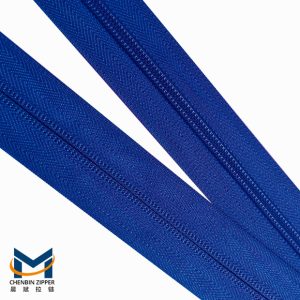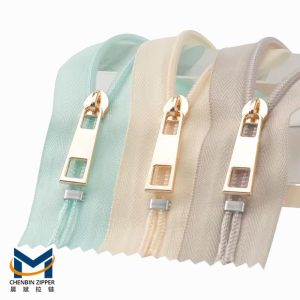Understanding Chain Zippers: An Overview
Definition and Importance of Chain Zippers
Chain zippers, frequently found in clothing, bags, and various accessories, play a crucial role in numerous everyday items. These zippers consist of metal or plastic teeth that bite into each other to hold two pieces of fabric together. The chain zipper offers a straightforward yet efficient mechanism for fastening and unfastening, rendering it indispensable in fashion and utility products. Due to their extensive use, it is vital to comprehend the functionality and importance of chain zippers to guarantee their proper upkeep and durability..
Different Types of Chain Zippers
There are several types of chain zippers available, each designed to meet different needs. The most common types include metal zippers, resin plastic zippers, and coil zippers. Molded plastic zippers, on the other hand, offer corrosion resistance and are often used in environments exposed to moisture. Coil zippers, made from polyester coils, can provide flexibility and are commonly used in lightweight fabrics. Understanding the different types of chain zippers helps select the appropriate zipper for specific applications, ensuring optimal performance and longevity.
Common Causes of Chain Zipper Failure
Mechanical Wear and Tear
Heavy Usage
Heavy usage is a primary factor contributing to the wear and tear of chain zippers. Frequent use subjects zippers to stress, resulting in wear and tear on the teeth and slider components. In items subjected to constant use, such as jackets, backpacks, and tents, the chain zipper experiences repeated friction and movement. Over time, this can result in the teeth misaligning, the slider breaking, or the zipper becoming sloppy to operate, necessitating timely replacements.
Material Quality
Low-quality metal or plastic might not withstand repeated stress and environmental challenges, leading to premature failure. Inferior materials are more susceptible to bending, corrode, or breaking under pressure. Therefore, selecting qualified material zippers ensures that the chain zipper can endure extended use without significant degradation, offering reliability and longevity.
Environmental Factors
Exposure to Water and Humidity
Environmental factors can adversely impact the functionality of chain zippers. When exposed to moisture, metal zippers are prone to rust and corrosion, while plastic zippers can experience reduced flexibility and strength. Humid conditions can cause condensation within the zipper mechanism, leading to jamming or increased friction. Regular exposure to such elements without adequate protection can significantly reduce the operational life of chain zippers.
Temperature Variations
Temperature variations also contribute to the failure of chain zippers. Extreme hot or cold temperatures can cause materials to expand or contract, affecting the smooth operation of the zipper. Metal zippers may become brittle in cold weather, increasing the risk of breaking, while plastic zippers might weaken and deform under high temperatures. Consistent exposure to temperature fluctuations can lead to the chain zipper malfunctioning or losing alignment, compromising its effectiveness.
User-Related Issues
Incorrect Usage Techniques
Lack of proper maintenance is another common user-related issue that compounds the likelihood of zipper failure. Neglecting to keep a zipper clean and lubricated can result in debris accumulation and increased friction, impeding its operation. Regularly checking for signs of wear and promptly addressing minor repairs can prevent more substantial damage. Maintaining the chain zipper ensures smooth operation and extends its usability over time.
Recognizing Signs of Impending Chain Zipper Failure
Visible Damage and Wear
Spotting visible signs of damage and wear is crucial for identifying potential chain zipper failure. Pay attention to indicators like missing, bent, or broken teeth, a damaged slider, or frayed edges along the zipper tape. These signs suggest that the chain zipper is approaching the end of its useful life or needs immediate attention. If these problems are detected early, they can be repaired or replaced in time, preventing the zipper from failing and maintaining the functionality.
Functionality Issues
Functionality issues are another critical sign of potential zipper failure. If the zipper frequently catches, requires excessive force to move, or fails to stay closed, it signals underlying problems. A chain zipper that does not function smoothly may be experiencing internal damage or misalignment. Monitoring the performance and addressing any interruptions in functionality helps maintain its integrity and usability, ensuring it remains reliable for continued use.
Preventive Measures for Extending the Life of Chain Zippers
Choosing Quality Materials
Selecting high-quality materials is fundamental in preventing chain zipper failure. Opt for zippers made from durable metals or robust plastics that can withstand environmental and mechanical stresses. High-grade materials ensure the zipper teeth remain intact and resist breakage under repeated use. Quality materials are the key to achieving the long-term functionality of chain link zippers, enhancing their durability and reliability.
Regular Maintenance Tips
Cleaning Procedures
Maintaining a clean chain zipper is essential for smooth operation. Regularly remove any dirt, sand, or debris that might accumulate within the zipper teeth. Using a soft brush or cloth, gently clean the zipper to avoid damaging the teeth and slider. For stubborn grime, gently apply a mild soap and water mixture to ensure the zipper is unobstructed and works effectively.
Lubrication Guidelines
Choosing proper lubrication is the key to extending the lifespan of a chain zipper. A light application of silicone-based lubricant or zipper wax can help reduce friction and ensure smooth operation. Avoiding oil-based lubricants is critical as they can attract dust and dirt, leading to dirt buildup. Regular lubrication, especially after cleaning, adds a protective layer that improves the performance and life of the zipper.
Proper Usage Techniques
Opening and Closing Methods
Adopting correct opening and closing techniques prevents undue stress on the chain zipper. Always make sure your teeth are aligned before you zipper up or down. Use smooth, even motions rather than forcefully jerking the slider, which can bend or misalign the teeth. Practicing gentle, deliberate usage reduces the risk of damaging the zipper and extends its functional lifespan.
Weight Limits Consideration
Being mindful of weight limits is crucial in preventing the chain zipper from failing. Avoid overloading the zipper with excessive weight, as it can strain the teeth and slider. Each zipper type has a specific weight capacity, and exceeding the limit can cause the zipper to split or the teeth to break. Understanding these limitations helps maintain the integrity of the zipper and ensures that it remains reliable under its intended use. Metal Zippers and Nylon Zippers are in superior demand for applications requiring load-bearing capabilities.
Repair Solutions for Faulty Chain Zippers
DIY Repair Kits
For minor sewing, DIY repair kits can be a convenient solution. These kits typically include essential tools and replacement parts such as sliders, zipper stops, and teeth. Following the instructions, users can address common issues like a broken slider or misaligned teeth on their chain zipper. Utilizing a DIY repair kit allows for prompt fixes, extending the zipper, and maintaining the functionality.
Professional Repair Services
When encountering intricate zipper problems or handling valuable items, it is advisable to seek professional repair services. Expert technicians with specialized tools are well-equipped to identify and resolve critical chain zipper problems. Whether it involves replacing a broken segment, aligning the teeth correctly, or guaranteeing the smooth operation of the zipper, professional services provide a dependable option for preserving the durability and functionality of chain zippers.
Best Practices for Buying Durable Chain Zippers
When purchasing chain zippers, it is necessary to consider several factors to ensure that you select a durable product. Selecting the right zipper involves more than just choosing the correct size and color; it requires a thoughtful evaluation of quality and suitability to the intended use.
Material Selection
One of the key aspects to consider is the material composition of the chain zipper. Metal zippers are excellent for heavy-duty and high-stress applications due to their strength and durability. However, they may not be suitable for environments with high moisture as they can corrode. Molded plastic zippers are a great fit for such conditions as they are resistant to rust and corrosion. For items that require flexibility and smooth operation, such as lightweight fabrics, coil zippers are a preferable choice. Opting for materials that align with the specific use-case scenarios guarantees prolonged durability and functionality.
Brand Reputation
Another vital consideration is the reputation of the brand. Brands with a history of producing reliable and high-quality zippers can offer the assurance of long-lasting performance. Look for brands that are well-reviewed and have a strong market presence. Reputable brands typically adhere to stringent manufacturing standards, ensuring that the chain zipper you purchase is of superior quality and designed to withstand frequent use.
Zipper Specifications
Carefully evaluate the chain zipper’s specifications to confirm it aligns with your application requirements. Consider aspects such as zipper size, teeth spacing, and locking mechanisms. Larger zippers with wider teeth suit heavy-duty items, while smaller zippers are better for delicate fabrics. Additionally, verify if the zipper includes features like auto-lock sliders that prevent unintentional opening, enhancing reliability.
Testing and Certification
Lastly, examine if the zippers have undergone rigorous testing and possess certifications that attest to their quality and safety. Certifications from recognized bodies can provide an added level of confidence in the product’s durability. Testing ensures that the zippers can endure various environmental conditions and mechanical stress, ensuring they perform as expected in real-world applications.
Final Thoughts on Ensuring Longevity of Chain Zippers
Ensuring the longevity of chain zippers requires a blend of preventive measures, proper maintenance, and informed purchasing decisions. By understanding the causes of zipper failure and adopting practices that mitigate these issues, you can extend the operational life of your zippers significantly.
Regular Monitoring and Maintenance
Consistent monitoring and maintenance of your chain zipper are vital. Perform regular checks for any signs of wear and functionality issues, addressing minor problems before they escalate. Cleaning and lubricating the zipper routinely ensures it operates smoothly and remains free of debris that can hinder its performance.
Education and Proper Use
Learn the proper methods for handling zippers and share this knowledge with others. Never force the zipper open or closed, and make sure the teeth are properly aligned before zipping. Proper handling practices can minimize the risk of damage and help the zipper maintain its integrity over time. Trusted manufacturers like CHENBIN ZIPPER often offer customer support and expert product guidance. Utilize these resources for advice on installation, maintenance, and troubleshooting for your chain zipper.
Quality Investment
When buying chain zippers, prioritize quality over cost. Investing in high-quality zippers from reputable brands pays off in the long run, as these zippers are designed to withstand frequent use and adverse conditions. Thoughtfully choosing zippers suited to specific tasks ensures they can handle the expected load and stress without compromising performance.
By following these guidelines and making informed choices, you can prevent zipper failures and ensure that your items remain reliable and functional. Understanding the critical aspects of chain zippers empowers you to maintain their longevity and performance, enhancing the overall durability and utility of the products they secure. It is best to choose a supplier that offers custom zipper services like CHENBIN ZIPPER, which can provide high-quality, personalized products specifically tailored to the customer’s needs so that you can better meet your multitasking needs!






